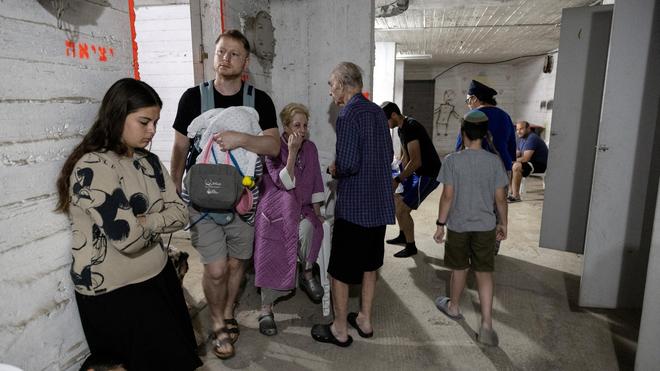Israel Launches Devastating Strikes on Iran’s Nuclear Program, Killing Top Military Officials and Escalating Tensions
Tehran, June 13, 2025 — Israel launched a powerful and coordinated military strike on Iran’s capital early Friday, targeting critical nuclear facilities and military installations. The attack, reportedly the most significant assault on Iran since its war with Iraq in the 1980s, killed at least two of Tehran’s highest-ranking military officials and raised fears of an all-out war between the two regional enemies.
Among the high-profile casualties were Gen. Hossein Salami, commander of Iran’s paramilitary Revolutionary Guard, and Gen. Mohammad Bagheri, Chief of Staff of the Iranian armed forces. Iranian state television confirmed their deaths and reported that several other senior military officials and nuclear scientists were also killed in the assault.
The strikes struck multiple targets, including Iran’s main uranium enrichment facility in Natanz, where black smoke was seen billowing into the sky. The International Atomic Energy Agency (IAEA) confirmed the hit on the Natanz site and stated that it was closely monitoring radiation levels.
Iranian Supreme Leader Ayatollah Ali Khamenei, in a strongly worded statement carried by the state-run IRNA news agency, vowed retaliation. He accused Israel of striking residential areas and declared that “severe punishment” would be directed at Tel Aviv. “Israel opened its wicked and blood-stained hand to a crime in our beloved country, revealing its malicious nature more than ever by striking residential centres,” he said.
Israeli Prime Minister Benjamin Netanyahu defended the strike, calling it a “pre-emptive assault” necessary to ensure national survival and prevent Iran from obtaining nuclear weapons. “It could be a year. It could be within a few months,” Netanyahu said, referring to how close Iran might be to nuclear capability. “This is a clear and present danger to Israel’s very survival,” he added, vowing to continue the military campaign “for as long as necessary.”
The strike pushed Israeli military resources to their operational limits, with the use of aging air-to-air refuelers enabling fighter jets to reach their targets. It remains unclear whether Israeli aircraft entered Iranian airspace or launched long-range standoff missiles from a distance. Witnesses in Iraq reported hearing fighter jets overhead, consistent with previous Israeli tactics of launching attacks from over Iraqi territory.
The operation comes at a time of heightened global concern over Iran’s rapidly advancing nuclear program. The IAEA Board of Governors on Thursday, for the first time in two decades, formally censured Iran for its refusal to cooperate with inspectors. In response, Tehran announced plans to build a third enrichment site and to install advanced centrifuges.
Despite concerns, U.S. intelligence agencies currently assess that Iran does not have an active nuclear weapons program, and Iran has maintained it has no intention of building a bomb.
In Washington, President Donald Trump — whose administration had cautioned Israel against military action amid ongoing diplomatic efforts — distanced the U.S. from the strike. “We are not involved in strikes against Iran, and our top priority is protecting American forces in the region,” said Secretary of State Marco Rubio in a statement. Trump himself, speaking on Thursday, said he did not believe an Israeli strike was imminent but admitted, “it could very well happen.”
Following the attack, the U.S. Embassy in Jerusalem issued a shelter-in-place order for American personnel and their families. Days earlier, on Wednesday, the U.S. had pulled some diplomats from Iraq and offered voluntary evacuations for military families in the region, suggesting it anticipated possible escalations.
Trump is scheduled to meet with his National Security Council in the White House Situation Room on Friday to discuss the crisis. While no public remarks have been announced, the president was seen on the White House lawn mingling with members of Congress minutes after news of the strikes broke. It was unclear whether he had been briefed at the time.
Netanyahu’s political rival, opposition leader Yair Lapid, offered full support for the military operation, signaling a rare moment of national unity despite the deeply polarizing war in Gaza, which has now entered its 21st month. However, domestic support may wane if Iranian retaliation results in heavy Israeli casualties or serious disruptions to daily life.
Anticipating a swift Iranian response, Israeli Defense Minister Israel Katz warned of potential missile and drone strikes targeting Israeli civilians. “It is essential to listen to instructions from the home front command and authorities to stay in protected areas,” he urged.
As news of the attack rippled across global markets, Brent crude oil prices surged nearly 8%, and both Israel and Iran shut down their airspace. Israel also temporarily closed Ben Gurion International Airport.
This major military escalation has dramatically altered the geopolitical landscape of the Middle East and left the world on edge as Tehran prepares its response to a strike it deems an act of war.

